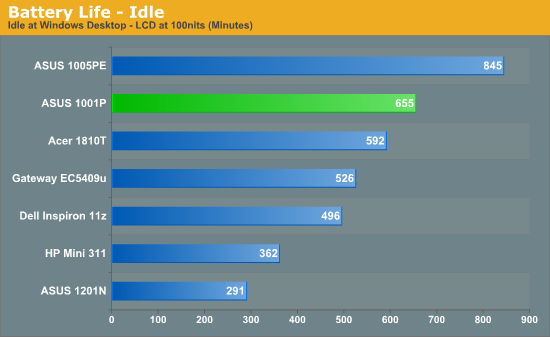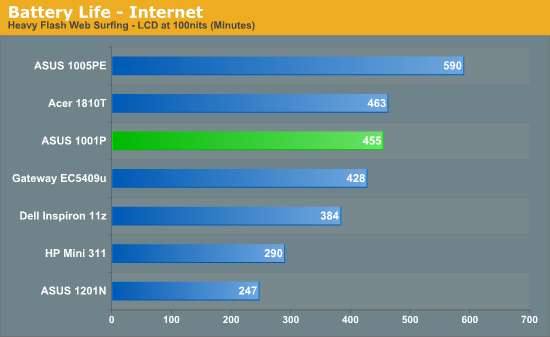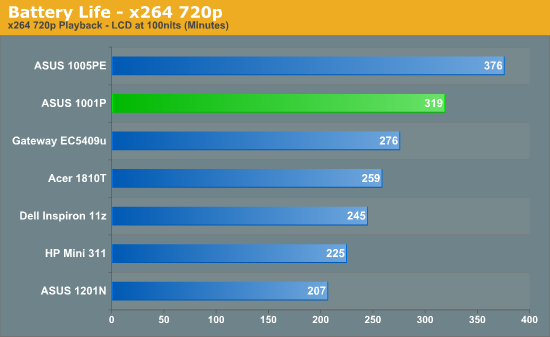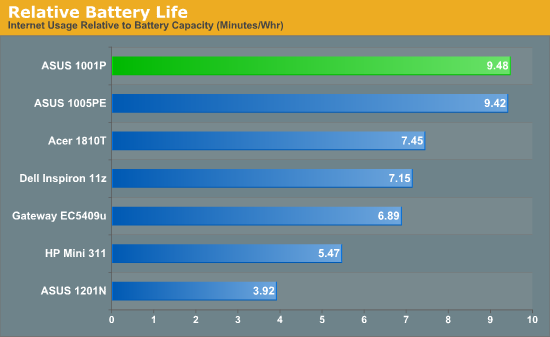Asus Eee PC 1001P: Our Favorite Netbook
by Vivek Gowri on March 16, 2010 11:30 PM EST- Posted in
- Laptops
Asus Eee PC 1001P: Battery Life
In our earlier tests of the Pine Trail-based 1005PE, we noted that the real victory of the new Atom processors was in the significantly reduced power consumption of the entire platform. This makes itself very noticeable in real world usage, with most 6-cell Pine Trail netbooks rated for anywhere between an impressive 8 hours to an absolutely astonishing 14 hours in the case of the 1005PE. The 1001P is rated at 11 hours of battery life—right in the middle.
While none of the devices actually reach their battery life targets in the real world (an idle battery life test isn't at all representative of typical use), having that much capacity on hand makes the new line of netbooks even more portable than the last. With 10 hours of battery runtime in the tank, the amount of mobility you're afforded is pretty refreshing. No more worrying about power cords, wall outlets, or the dreaded "will I have enough battery left after class to write this paper?" questions. Let me put it this way—the 1001P has better battery life than my first two iPods. Yeah.




Based on the test results, we can see that the 1001P has lower battery life than the 1005PE, and similar runtimes as the 1005HA. This is as expected, because of the 48Wh battery; the top end 1005 models tested both had larger capacity 63Wh batteries. So, the generational gap essentially means that you can achieve the same battery life results from a smaller and lighter battery. And that's why netbooks still remain relevant—double digit battery life on a $300, sub-3 pound machine that still runs Windows is a pretty awesome concept, languid performance notwithstanding.










63 Comments
View All Comments
mczak - Wednesday, March 17, 2010 - link
Conclusion says the only thing you give up over 1005pe is battery life. I think in this time and age, not having n-wireless is a fairly big omission too. Maybe not quite a deal breaker, but I'd consider that an important distinction between the two (maybe even more so than the battery life difference).I'm wondering though if we'll see most netbooks switch to the N470. Not exactly a performance demon neither, but every little bit helps...
ric3r - Wednesday, March 17, 2010 - link
It's purely a cost thing, and honestly, so many public hotspots are still on g (or b) wireless that it's not really a necessity to have -n wireless. Yeah, it's nice to have, but not essential.As for the N470, yeah, we'll see. I haven't noticed any difference speed-wise between the N270, 280, and 450, but the N470 does offer a comparatively substantial speed bump so maybe it'll do better.
heulenwolf - Wednesday, March 17, 2010 - link
Agree, I'm tired of the G-only devices holding up my N-network at home. Even the Nexus One found a way to put N-networking in the device. I guess it comes down to cost, though. A part costing $x more on an unsubsidized device tends to lead to a retail price $3x more. I don't think the mass market wants a netbook when the price creeps near $400. So, perhaps the G-only networking was a cost-cutting measure to keep the price well out of the range where people could even round up to $400.mucker365 - Wednesday, March 17, 2010 - link
> I'm tired of the G-only devices holding up my N-network at homeHolding up, how? Do you have an internet connection with better throughput or latency than wifi g?
Veerappan - Thursday, March 18, 2010 - link
He could be referring to inter-computer transfers, such as streaming videos off of a NAS via wireless. I've had issues in the past with collisions on a 802.11G network impacting playback performance of HD video streamed from another computer on the network.I'd also love to do a NAS setup with my Linux boxes where there is a network-mounted home directory, but as it is the wireless speed of 54mbit/s (when I'm lucky, more often it's in the 30mbit range) makes that impractical.
It's also very possible that he is being held back by his router in his network speed. My FiOS connection at home has been clocked by DSL Reports at 25mbit/s down and 18.5mbit/s up (this has been echoed by real-world transfer speeds). Add those upload/download figures together, add in collision reset times, and 54Mbit/s could actually be a limiting factor.
Shadowmaster625 - Wednesday, March 17, 2010 - link
I had the chance to play with a netbook with the same specs as this. I was impressed until I put it in sleep mode. I put my ear up to the vent and noticed that the fan was still running. It never shut off. I tried waking it up but it never came back on. Apparently during the process of closing the netbook lid (which puts it to sleep), I must have caused a hard drive I/O error which locked up the netbook. So it never suspended and the fan never shut off.What a joke. It had to be the hard drive. The hard drives in these things are nothing more than cheap garbage. You know it, I know it, everybody knows it. Anandtech ought to be ashamed of themselves for recommending such garbage. Even the smallest, crappiest SSD is better than crap that breaks on a dime. I dont care what any of these morons say, do NOT trust a netbook hard drive any further than you can throw it.
strikeback03 - Friday, March 19, 2010 - link
So you write off the entire category because one example of one design had an issue?JonB - Wednesday, March 17, 2010 - link
You would think a nice, solid state hard drive would be problem free, but it sure wasn't for me. I have replaced the failed 8GB Intel SSD with a cheaper and faster 16GB SuperTalent. This was an Acer AspireOne, though, not the Asus series.When an SSD fails, apparently it just goes away. No warning, no chance of recovery.
Hard drives, even cheap hard drives, usually give some warning.
mckirkus - Wednesday, March 17, 2010 - link
I wasn't aware that Intel made 8GB SSDs. The new generation are around $100, 5x larger, and are rock solid. In fact, some say they're better at dealing with failures than the rotating variety.I'd rather have a super fast 40GB SSD in one of these things than a 250GB spinning disaster waiting to happen.
8 & 16 GB SSDs are really old tech.
JonB - Wednesday, March 17, 2010 - link
Both the 8GB and 16GB SSDs are literally the size of a credit card and barely thicker. A short ZIF ribbon cable connection to the motherboard.My AspireOne is running a slightly modified Linpus so needs very little room and I store everything of value on SD cards. My netbook is not a desktop replacement in any way; more like a huge smartphone.